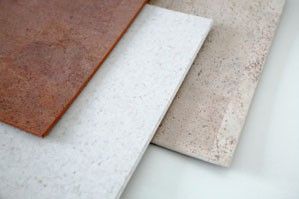
Cork flooring is a natural and very eco-friendly flooring option in the interior setting. It is derived from the cork oak bark, and is compressed to make a wonderful type of flooring. Because of its natural quality, beauty, and warmth, it has found its place in all types of interior settings. However, a lot of people now wish to use cork flooring in bathrooms, and whether or not it is a suitable option is what bothers them the most. Here, we will try and understand the pros and cons of using this flooring in the bathroom.
Can you use Cork Flooring in a Bathroom?
The natural properties of cork do not make it very moisture-resistant. As such, experts would recommend that you don't use this type of flooring in a bathroom, where moisture levels and spillage are extremely high. Further, cork flooring is available in tile form, where it is to be adhered to the floor, and in plank form, where it has an interlocking system that allows for a floating floor installation. Planks are not recommended for bathrooms, as any gaps in it may allow moisture to be retained and result in the growth of mold and mildew. This can prove very unhealthy for everyone using the bathroom in the long run. Also, its absorption of moisture can lead to the floor slowly rotting and losing its charm. Now these are the disadvantages of using natural cork flooring in the bathroom. However, there are ways and means by which you can make cork a more bathroom-friendly flooring option, and use it to give your bathroom that warm feel.
As the variety of materials to be used in the world of interior design increases, so does the quality of these materials. Special cork flooring is being designed specifically for bathrooms by giving it appropriate treatment. Further, there are several steps you can resort to, so that you can conveniently use it in the bathroom. These steps have been enlisted here.
- For one, the bathroom has to be caulked from all four sides, to make the flooring completely waterproof, and prevent any moisture from entering it through the sides. These edges will include those around the toilet too.
- Secondly, as mentioned earlier, in the bathroom, only cork tiles are suitable and not the planks. The reason for this choice has already been made clear.
- Finally, a PVC or polyurethane coat should be given to the bathroom floor, so that it becomes completely water resistant.
It is interesting to note that cork flooring has a property that repels insects. It is also said that it is resistant to moisture, but in very humid areas such as bathrooms, this resistance cannot hold for very long. Using it in a bathroom will give it a great, rich, warm look, but such flooring also requires high maintenance. You have to keep out a watch for cracks or gaps that may result in your flooring getting damaged because of the moisture.
The durability of cork flooring when used in the bathroom is low, if the aforementioned measures are not followed. As mentioned earlier, experts still are against its use in a bathroom, in spite of the many ways of making it more suitable for the bathroom setting.





